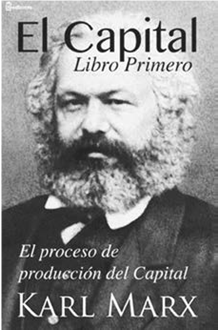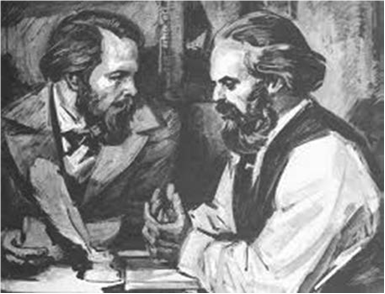 Capital is one of the most important works of Karl Marx and Friedrich
Engels; although outlined and written primarily by the former, it was
completed by the latter because Marx died without finishing his
outstanding work.
Capital is one of the most important works of Karl Marx and Friedrich
Engels; although outlined and written primarily by the former, it was
completed by the latter because Marx died without finishing his
outstanding work.VENEZUELA
Marxist-Leninist Communist Party of Venezuela (PCMLV)
 Capital is one of the most important works of Karl Marx and Friedrich
Engels; although outlined and written primarily by the former, it was
completed by the latter because Marx died without finishing his
outstanding work.
Capital is one of the most important works of Karl Marx and Friedrich
Engels; although outlined and written primarily by the former, it was
completed by the latter because Marx died without finishing his
outstanding work.
It fell to Engels to complete the work that took decades of the life of both of them, based on manuscripts and with the help of Marx’s daughters. It is a work of great importance that, despite the extensive and high level of specialization of the topics discussed, was prepared using a method which simplified the explanations, first because its author took pains to make it understandable, and second because the working class, for whom it was written, can assimilate its content with remarkable ease since it deals with issues they experience in everyday life.
A short historical review of Capital
Capital first appeared in 1867 in the native language of the author (Das Kapital, Kritik der politischen Oekonomie); later, in August 1872, it was published in French, in installments for ten centimes, which continued until 1875, being published after an exhaustive revision by the author. He not only revised but rewrote the text, introducing “changes and additions.” This lead Marx himself to say: “Hence, whatever the literary defects of this French edition may be, it possesses a scientific value independent of the original and should be consulted even by readers familiar with German.”1
After Marx’s death, his comrade Engels and his daughter Eleanor Marx took up the task of working on the original manuscripts to complete the second and third volume. Years later the Marx-Engels-Lenin Institute of the USSR, as well as other publishers, took on the task of reviewing all the quotations and finding the exact sources from which they were taken. Hundreds of translations into various languages have made of this extraordinary masterpiece a must reading for the serious students of economy and especially for us Marxist-Leninists, who find it an invaluable contribution to the study and dissemination of the scientific conception of society.
Some theorists have spread the idea that Capital is too complex a work, only understandable by scholars. This may also be due to the fact that it is a voluminous book, which could frighten many people. Furthermore, the beginning of the work presents a degree of abstraction able to intimidate, which has helped to strengthen the image of intellectual inaccessibility. This was rebutted by the editor [of the French edition] La Chatre in a letter to Marx: “As for the fear that readers will be put off by the dryness of the economic material dealt with in the first chapters, the future will tell us if this has merit. Let us hope that people who take up your work, which has as its main objective the study of economic doctrines, will not stop reading it due to the application of your analytical methods; everyone will understand that the first chapters of a book should be used for abstract reasoning, a first requirement for burning topics that excite the spirit, and only gradually can they arrive at the solution of social problems discussed in the following chapters. I am convinced that all readers will want to continue until the end of your magnificent theories.”2
The huge size of the work and its cost made its purchase by workers difficult. Therefore Marx and his publisher sought a practical answer: “The method of publication that we adopted, a serial for ten centimes each, have the advantage of allowing a greater number of our friends to get their book, because the poor can only afford to pay for science with very little money; and the objective that you set will have been achieved: make your work accessible to everyone.”3
We Marxist-Leninists should break down the myth of the inaccessibility of Capital and encourage our members to study it, looking for the method that will allow them to make practical use of the explanations and ideas contained in this wonderful work. For such a task the role of the party is very important in order to promote its study and make practical use of the understanding shown by Marx and Engels, so that it does not remain a simple task of intellectuals or for pure theoretical abstraction. For this reason the PCMLV has made known its experience during 2014 which aims to make practical use of studying this work of Marx and Engels, promoting its scientific study and application to the militant action of the party and its mass organizations.
 A concrete experience with Capital
A concrete experience with Capital
As a product of the historical development of our work, and after several years of attempts, our party has developed the first school of Capital, in which the cadres of the PCMLV will learn the investigative and explanatory method of Marxism and the deeper knowledge contained in this great work.
Many people may ask how a party in struggle with countless tasks to take up can dedicate itself to investigating and bringing its cadre to a school on Capital; for us the answer is in the question itself: the more complicated the scene of struggle, the deeper must be our understanding and the higher our preparation. For this reason we have made an effort, after a year of final preparation and a great number of meetings and discussions to define the method and facilitators of this task. We concluded with a method that combines individual with group study, of facilitators and participants, the preparation of areas and the techniques to adjust the system of study to obtain the best result.
Among the various objectives planned for the First School of Capital for the cadres of the PCMLV, there are: 1. To deepen the understanding of the economic foundations of the functioning of capitalist society, 2. To Consolidate the concepts of Marxist political economy, 3. To raise the ideological and political level and the unity of the party cadres, 4. To deepen the investigative and explanatory method of Marxism-Leninism.
Explanations of the facilitator, videos and questions are combined with previous work sessions, among the facilitators, which have been extended for a year, and which ended with two consecutive days of study for each volume, with an interval of one month for the next.
From the beginning significant results have been seen, since the group of facilitators has had to develop intense individual study and team discussion sessions, in addition to preparing their exposition. This has raised the theoretical level and has led to discussions, even in the Central Committee, to unify criteria on the interpretations and expositions; further, it has promoted among the members the search for answers to many questions that arose in individual study.
By the end of 2014 about 30 cadres of our party will have completed the first cycle of study of the three volumes of Capital and another similar group is preparing to complete this study by the end of 2015.
The task has been difficult but rewarding and we hope that it will serve for exchanges with other fraternal parties that have developed experiences of this kind or who are willing to take part in them.
CC of the PCMLV1. Marx, Capital, Afterword to the French edition, 1875.
2. Letter from Maurice la Chatre to Marx. June of 1890. From the Spanish edition of Capital by Cartago Publishers.
Click here to return to the Index, U&S #29